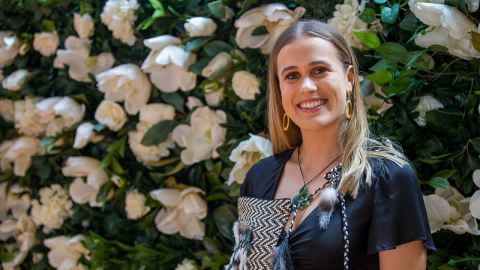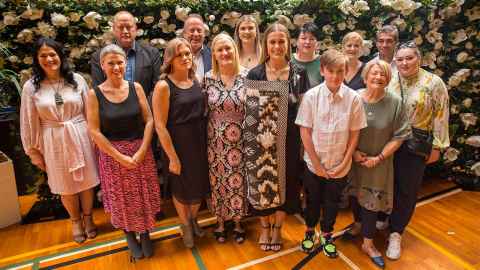The human element
17 December 2019
Briana Northey is a people person, and it’s this “human element” of medicine that has helped drive her to graduate from the University of Auckland with a Bachelor of Medicine and Bachelor of Surgery.

It’s been a long, relentless journey, she says, but Bri (Ngāti Raukawa ki Otaki) has been supported every step of the way, right from when recruiters visited her Year 12 class at Whangarei High School to plant the seed of a career in health.
Under the “Vision 20:20” umbrella, the University’s Faculty of Medical and Health Sciences runs wrap-around recruitment and support programmes with the goal of boosting numbers of Māori and Pacific health professionals.
In 2012, Bri attended the Māori Achieving Success in Health (MASH) kaupapa run by Whakapiki Ake, a four-day programme exposing Year 12 rangatahi to the University’s health pathways and careers at Auckland District Health Board. The same year, she also tapped into national Māori health workforce development programme Kia Ora Hauora.
“These programmes ignited a passion to reduce health inequities and contribute to better health outcomes for Māori,” she says.
Bri was among 83 Māori and Pacific graduands who attended the 2019 MAPAS Completion Ceremony in November, which is held every year the day before the main Faculty of Medical and Health Sciences graduation.
She’s now working at Tauranga Hospital as a house officer (junior doctor) before deciding on her speciality.
"I’m really interested in obstetrics and gynaecology. It’s an area where there’s a lot of inequities; a lot of young Māori mothers who don’t have adequate access to health care, and we know there’s worse outcomes for babies and mums."
Looking ahead at the next phase of her career, she says, "It feels really good, it kind of feels a bit surreal, but it feels good."

“I’ve had so many sources of support from Māori and Pacific Admission Scheme, Whakapiki Ake and Kia Ora Hauora, that are all about suporting Māori students, as well as from my whānau," she says. "I’m grateful that there’s been some many people around to help with what has been a really rewarding and exhausting journey.”
Vision 20:20 embodies the university’s commitment to increasing the number of Māori and Pacific health professionals to 10 percent of the health workforce by 2020. It encompasses the Whakapiki Ake recruitment programme, Hikitia Te Ora (a foundation Certificate in Health Sciences) and the Māori and Pacific Admission Scheme (MAPAS). Students who enter under the scheme have to achieve the same grades as other medical and health science students to progress through their degrees.
Kia Ora Hauora has over 3000 registered members, with more than 1500 in tertiary study, 1000 at secondry school and 500 in employment.
Bri has also been learning te reo at night classes for the past few years. She describes herself as “being on her Māori journey”, which was nurtured by her time at medical school and, in turn, clarified her kaupapa. She says it has made her feel more grounded.
“I’m definitely not where I would like to be on my cultural journey, but I am passionate about furthering my te reo and know it positively impacts my mahi,” she says.
“Whether that’s being another Māori doctor and increasing the number of Māori health professionals in the workforce or through my day to day actions – I’ve always been interested in public health and I think I can contribute by being involved in projects working towards the overall goal of achieving equity and better health outcomes for Māori.”
She encourages rangatahi to seriously consider a career in health. “We need more Māori in the health workforce, whether that’s nursing, medicine, pharmacy, optometry, public health, psychiatry - across the field. So high school students, start getting interested, stay with your sciences, and go for it!”
Media contact
Nicola Shepheard | Media adviser
DDI: 09 923 1515
Mob: 027 537 1319
Email: n.shepheard@auckland.ac.nz